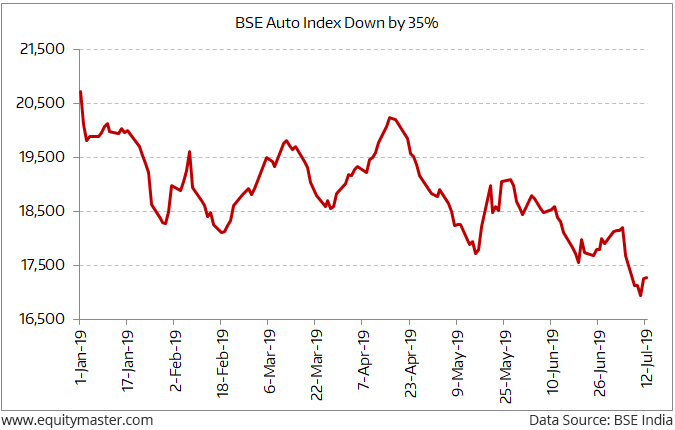India's Third Giant Leap
This Could be One of the Biggest Opportunities for Investors
- Home
- Todays Market
- Indian Stock Market News July 31, 2019
Sensex Trades Flat; Realty and Telecom Stocks Drag Wed, 31 Jul 12:30 pm
Stock markets in India are presently trading on a flat note. The BSE Sensex is trading down by 61 points and the NSE Nifty is trading down by 17 points. Meanwhile, the BSE Mid Cap index and the BSE Small Cap index are trading down by 0.2% and 0.5% respectively.
Among the sectoral indices, automobiles stocks and energy stocks are witnessing maximum buying interest. Realty stocks and telecom stocks are trading in red.
In the news from the automobiles sector. Hero MotoCorp share price surged over 4% after the company reported 38.3% rise in its net profit at Rs 12.6 billion for the quarter ended 30 June 2019 as compared to Rs 9.1 billion for the same quarter in the previous year.
However, Total income of the company decreased by 7.6% at Rs 82.5 billion for Q1FY20 as compared Rs 89.3 billion for the corresponding quarter previous year.
On the consolidated basis, the company has reported a rise of 35.9% in its net profit at Rs 12.6 billion for the quarter under review as compared to Rs 9.2 billion for the same quarter in the previous year.
However, total income of the company decreased by 6.9% at Rs 84.1 billion for Q1FY20 as compared Rs 90.3 billion for the corresponding quarter previous year.
Speaking of the automobile space, the BSE Auto index is down 35% since the start of this year.
Multiple factors have affected the auto sector of late.
The liquidity crisis faced by NBFCs, regulatory changes leading to increased costs, new emission norms... they have all taken their toll.
Also, this sector is ripe for disruption with electric vehicles and ride sharing applications.
The coming one year will be a real test for India's auto companies.
It will also tell us if this slowdown is temporary or if there has been a structural change in the sector.
Richa Agarwal, editor of Hidden Treasure believes that the companies which will adapt their business models to the rapidly changing environment will survive and thrive.
In fact, she has picked out 4 Rebound Stocks to profit from the market crash.
Moving on to the news from the economy. Hitting a new all-time high, India received the foreign direct investments (FDI) inflow of US$64.4 billion during the financial year 2018-19 (FY19).
According to the Annual Report 2018-19 of the Department for Promotion of Industry and Internal Trade (DPIIT), FDI worth US$286 billion were received in the country in past five years.
FDI brings in resources, the latest technology and best practices to push economic growth on to a higher trajectory.
As per the report, path-breaking reform measures undertaken during the last financial year have resulted in India surpassing the FDI received in FY17 and registering an inflow of US$61 billion during FY18.
The FDI inflows were US$45.1 billion during FY15 when Prime Minister Narendra Modi-led NDA government assumed power. The inflows were US$55.6 billion in the following year.
Note that, the FDI into India exceeded that into China in 2018.
That is a testament of the fact that India's foreign investment policies and business environment are finally competing with that of its Oriental neighbour.
India aims to receive US$ 100 billion in foreign direct investment (FDI) in the next two to three years.
Special industrial clusters are being created for countries like Japan, South Korea, China, and Russia where their companies can invest and operate.
To know what's moving the Indian stock markets today, check out the most recent share market updates here.
For information on how to pick stocks that have the potential to deliver big returns, download our special report now!
Read the latest Market Commentary



Equitymaster requests your view! Post a comment on "Sensex Trades Flat; Realty and Telecom Stocks Drag". Click here!
Comments are moderated by Equitymaster, in accordance with the Terms of Use, and may not appear
on this article until they have been reviewed and deemed appropriate for posting.
In the meantime, you may want to share this article with your friends!